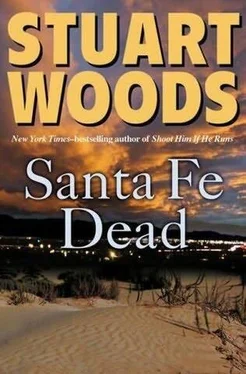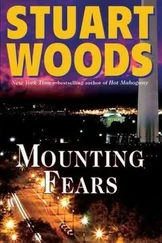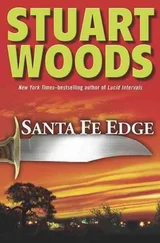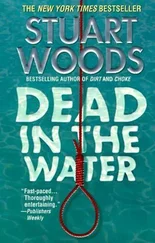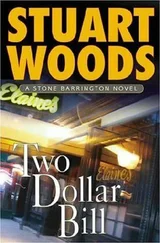“It’s an electronic keypad; the combination was DWELLS.”
“Not very smart,” Eagle said.
Wells looked sheepish. “It was the first six letters I thought of, I guess.”
“Then they could have just guessed and got lucky.”
“I suppose.”
“Did your wife know the combination?”
“Yes.”
“More likely they pointed a gun at your son and demanded the combination from your wife.”
“She would certainly have given it to them, in those circumstances.”
“Mr. Wells… ”
“Don, please.”
“Don, did your wife have a will?”
“Yes. Both her will and mine are in my safe in Malibu.”
“Have you read it?”
“No; both wills are in sealed envelopes.”
“Are you familiar with the terms of her will?”
“Only what she told me: that she had made a large bequest to her family’s charitable foundation and some other, smaller bequests to distant relatives, servants, that sort of thing. Then there would have been a large bequest to a trust for our son, to ensure that he had a home and proper care. I think I told you, he’s… was autistic.”
“Is there a bequest to you in the will?”
“Yes, but I don’t know of what size.”
“Your wife, I understand, was a very wealthy woman.”
“Yes, she was; her great-grandfather established a pharmaceutical company in the late nineteenth century. It was a private company, until after her father’s death some years ago; it was taken public, then she gradually liquidated her holdings.”
“What was she worth?”
“I don’t really know, but I think, probably, some hundreds of million dollars.”
“I have to ask you some other questions now, and please don’t take offense; this is absolutely necessary, and the district attorney is going to want them answered, too.”
“Go ahead. I’ll tell you whatever you want to know.”
“What is your own net worth, Don, separate from your wife’s?”
“Well, we owned the two houses together, so half of the value of those, I guess. Maybe twenty million dollars. Then I have some investments, probably another three million, plus other possessions. Maybe a total of twenty-five million dollars? I can have my business manager put together a financial statement, if you like.”
“Please do so tomorrow and have it faxed to my office. Now, who paid for the two houses?”
“My wife did; she insisted. While I’m very well off and could have afforded to buy the Santa Fe house, I could not have afforded the Malibu Colony house. She chose them both and bought them.”
“But they were put in both your names.”
“Yes, that’s how she wanted it.”
“What sort of income do you earn from your film business? An average for the last five years, or so?”
“Let’s see: probably an average of two and a half, three million dollars. I have prospects for a lot more in the future.”
“Will your wife’s death affect your income?”
“No. She had no interest in my business. She loaned me the money to get it started, and I repaid her.”
“I assume you can substantiate that.”
“Of course. My business manager has copies of all the documents.”
“I’ll want to see those, too,” Eagle said. “One more question, then I’ll let you get to bed, and I need a perfectly honest answer. Remember, this is a privileged conversation.”
“Shoot.”
“Are you now having or have you ever had an affair outside your marriage?”
“I’ve slept with a few women, mostly minor actresses or crew on my pictures. Nothing serious, ever.”
“Define serious. ”
“Serious enough to make me think of leaving my wife.”
“I warn you, Don, if you are being less than frank with me, it will come back and bite you on the ass.”
“I’m being perfectly frank with you,” Wells said.
Eagle thought he believed the man.
“Good. We have an appointment at nine tomorrow morning in my office with the district attorney, Roberto Martínez, and a Detective Reese. You’ll give a formal statement along the lines of our previous conversations on the phone and tonight. I’ll pick you up out front at eight forty-five.”
"Fine.”
IT WAS NEARLY Eagle’s bedtime when he got home, and Susannah was already asleep in his bed, but there was something on his mind, and he had to deal with it.
He went to his study and switched on the computer, then opened his word-processing program and began to write.
To Walter Keeler:
Dear Mr. Keeler,
You and I are not acquainted, but I am in possession of some informationwhich I feel you should have. I met Joe Wilen on the golf course today in Santa Fe, and during our conversation later at the clubhouse, he told me that you and he had been business associates and that he is your personal attorney. I thought it would be better if I asked him to deliver this letter than if I simply sent it to you. I have not, however, discussed its contents with him. I have told him only that it concerns the woman you recently married. The following is everything that I know of her.
She was born Hannah Schlemmer, in Cleveland, Ohio, one of three daughters, to a Jewish pawnbroker. As an adult she moved to New York City and worked in a restaurant there. At some point she married a diamondwholesaler named Murray Rifkind, and she worked for some time at running his office.
She subsequently met a man named James Grafton and fell in love with him, apparently her first time. Grafton had a criminal background, and he convinced her that the only way they could be together was for him to rob Rifkind’s business premises. She went to the office and used her knowledge of its security systems to admit him for the robbery. Grafton then shot and killed her husband. She was shocked, she said, but he forced her to come with him to Miami, where he liquidated the diamonds he had stolen.
Shortly after that, they were both arrested. Hannah then agreed to cooperatewith the prosecution and testified against Grafton. She pled to involuntarymanslaughter and received a sentence of five to eight years in a women’s prison near Poughkeepsie, New York. During this time, I visited her in connection with a double murder in a client’s home in Santa Fe, involving her older sister, Miriam, who had changed her name to Julia. Hannah would ordinarily have been considered for parole after three years served, but as a result of a lawsuit against the State of New York alleging prison overcrowding, she was released early and unconditionally. While in prison, she legally changed her name to Barbara Kennerly.
Shortly after her release, Barbara came to Santa Fe and contacted me. I helped her find employment, and we began to see each other socially. A romance developed, and we were married a year later.
We had been married for a year when I awoke one morning to find that I had been drugged the night before and that Barbara had left Santa Fe after emptying my bank accounts of an amount exceeding a million dollars and wire-transferred the funds to a Cayman Islands bank and thence to one in Mexico City. She also attempted to empty my brokerage accounts, but I was able to prevent that minutes before the broker would have wired the proceeds.
I hired a former IRS agent, specializing in forensic financial work, who was able to recover all but $300,000 of the funds. I also hired two private investigators to go to Mexico and try to persuade Barbara to sign divorce papers and a settlement agreement giving her the $300,000. She shot one of the investigators and pushed the other off a ferry in the Gulf of Cortez. Both recovered. My investigators learned during this period that Barbara and her sister, Julia, by then deceased, were being sought by the Mexican police on a charge of having cut off the penis of a man they said was trying to rape them.
Читать дальше
